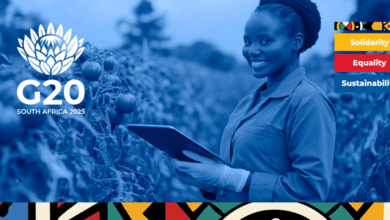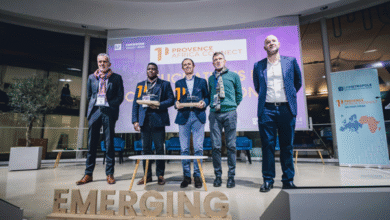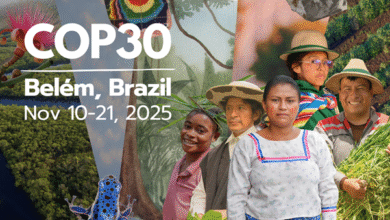Interview « The new African history will not happen without the restitution of works that have been plundered »
Cape Verde is a good student of the continent when we examine its governance, socio-economic progress, and its infrastructure. Cape Verde recently elevated to the rank of middle-income country which has also embarked on an ambitious policy to enhance its cultural heritage and promotion of the creative industries. This should be achieved thanks to a deliberately pan-African approach. This was the explanations with Abraao Vicente, Minister of Culture and Creative Industries of Cape Verde.
Interview by Dounia Ben Mohamed in Mindelo (Cape Verde)
Cape Verde relies on its cultural heritage and creativity to develop its economy and its attractiveness, particularly tourism. What are the main axes of your strategy?
By 2020, many projects that have been launched as part of our culture promotion strategy, will bear its fruit. A strategy has been implemented during our five-year mandate in Cape Verde. Among these projects, is the opening of a cultural center that focuses on designs and crafts, a one million euros’s project which fully funded by the Cape Verdean government. We have also initiated a 10 million euro project which aims to rehabilitate heritage.
We will continue the program of granting access to cultural pathways in 70 schools across the country in order to teach the musical and artistic crafts. We are also working to formalize professions related to art and culture. Artists and creators have very fragile careers because they have no social security, since they do not pay taxes, they reach a time in their lives when they find themselves dependent on the state aid. Moreover, and for three years now, Cape Verde has joined all international treaties that are to the protection of copyright. A new law has recently been adopted for this concern. It consists of a law which finances the entities managing intellectual property. The issue of intellectual property is very fundamental, that is why we have to estimate the contribution of Africa in the market of the cultural and creative industry. Copyright collection is estimated at $ 7 billion a year while Africa only represents 290 million. This is why African countries must organize themselves to create management entities that are responsible for collecting these amounts.
A law which equally introduce sanction. However it is difficult to apply, when it comes to plagiarism of works that are widespread, especially with the deployment of the Internet in particular …
Nowerday, it is very difficult to control all forms of hacking and fraud. This is why Cape Verde has acceded to international copyright protection treaties which also take into account the digital aspect. Cape Verde is working with INPI (NDLR: The National Institute of Industrial Property) to have the same step done with other African countries, especially Portuguese-speaking ones like Angola. There will be no collaboration without standardizing the level of protection. If we are talking about music mainly for now, our aim is to extend it to all areas of artistic creations. Above all, Cape Verde has signed the agreement relating to the restitution of artistic works and it intends to be part of the group which will take this project to the international level.
The main objective is to work at the pan-African level, and to present Africa with leaders who are aware of their rights at the international level. It is in this sense that Cape Verde is strengthening its presence among international organizations such as UNESCO.
There is an ongoing debate concerning this issue, including inside Africa: advocates of restitution, and others, given the lack of museums and infrastructures adapted to receive these artistic works and to advocate the mobility of these works which are part of the patrimonium of mankind…
I believe that artistic works must return to their country and place of origin. Also, those who want the restitution of their works must assume the responsibility and build the national museums to be able to accommodate them. This is why Cape Verde is going to lobby at the level of African multilateral organizations to mobilize funds for the restitution of works. If Benin wants to recover its works, it is not just the responsibility of Benin but also of all African countries to help Benin. The new African history will not happen without the restitution of the artistic works that have been plundered. It should be realized that the physical presence of these artistic works is part of the African cultural heritage.
This having been said, the budgets of African states are shrinking and culture does not take priority . Does Cape Verde, which finances its projects with equity, have an alternative financing model to offer?
If Cape Verde is a successful example for building infrastructure, it can also influence other countries. Senegal also, with its Museum of Black Civilizations that has all required conditions to be a museum of international reference. After the restitution, pne must have the capacity to do marketing and to introduce these museums and these African works to the world. The Statue of Liberty is no prettier than that of the Renaissance in Dakar. But if the Eiffel Tower and Notre Dame are known around the world, it’s because France is marketing around. African countries must also invest today in this area. Nowerday it is much easier thanks to the digital instruments from which we benefit. And together, we can do it.
In the digital domain, with the new submarine fiber optic system, the country will experience better connectivity. Enough to stimulate different sectors of the economy, including the creative industries ...
In terms of digital infrastructures, we have two challenges: the first to create clean infrastructures,and to have a strong presence at the international level. We are way behind if we compare ourselves to other countries. Africa is only a consumer and our content is blocked by algorithms. It’s not just about sharing the good news about Africa but it is also about having the audience that would receive the news. We must create content, enhance it, and disseminate it. Africans have access to the whole world, they can travel, have knowledge and they can add value to global culture. The fundamental objective is to create good quality infrastructure by establishing International standards. When people travel around, they compare things. Which goes back to the challenge of education and to a conventional education. Africa must add African aspects. The knowledge produced by Africans must be integrated into the education systems, which is why we need African scientists, with more visibility of the world. We cannot continue to be a subject of studies for others and we cannot continue to consume the knowledge produced by others about us.
In a nutshell, despite its successes, and even though it appears to be a good student in several fields, and it could be looked up to as a model, Cape Verde is very little present in the media, the major international conferences in Africa. How do you explain this?
We still have a lot of hard work to do. We believe that first of all we must consolidate our institutions before pretending to be a model to follow. We are currently working on this. Many partnerships have been already initiated with African countries. We are a country of less than a million people. Our strategy is to partner with major countries. In the coming years, Cape Verde will be able to make its voice heard in the transformation of mentalities around the world.






